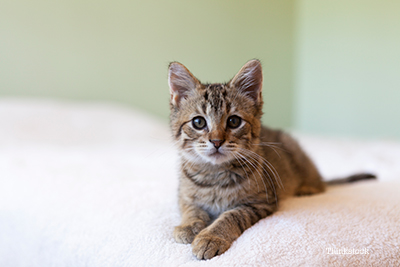
So you took a big step. You brought a new kitten home. Some kittens are obtained from rescue adoption groups; some are adopted as strays who are foundlings; some are obtained from private individuals whose cat had a litter and some are obtained from breeders of pure bred cats. From the kitten’s perspective it really doesn’t matter since all kittens have similar health needs and vaccination requirements.
It is important to discuss vaccination recommendations with your veterinarian since the timing of intervals between vaccinations may vary depending on the age of the kitten. Most kitten vaccination recommendations are the same regardless of the kitten’s origin but there may be some variables depending on whether or not the kitten will live a strictly indoor life (I highly recommend that your cat remain indoors).
The first steps for a new kitten
There are a few things you should do right away to be sure your new kitten is free of parasites and viruses:
- First, request that your veterinarian perform a complete and thorough physical examination.
- Second, be sure the kitten is tested for intestinal worms and treated if necessary. Some of these worms are potentially dangerous to people.
- Third, test the kitten for “retrovirus” infections like Feline AIDS (FIV) and Feline Leukemia virus (FeLV).
New kittens and vaccinations
Once these steps have been taken and the kitten is healthy you should start thinking about vaccinating her to make sure she stays healthy. I recommend starting vaccinations at about 8 weeks of age, continuing until the kitten is 4 months old.
According to the American Association of Feline Practitioners (AAFP), the core vaccines (those that are recommended for ALL cats) are feline panleukopenia virus (FPV), feline herpesvirus-1 (FHV-1), and feline calicivirus (FCV) as well as Rabies.
Feline Rhinotracheitis, like Feline Calicivirus is a respiratory infection and can become chronic if a kitten gets sick, so this vaccine may also be recommended by your veterinarian.
Additionally, your veterinarian may recommend the Feline Leukemia Virus (FeLV) vaccination. Granted, indoor cats are not at a lot of risk for this disease, but you can never be 100% certain that the kitten will never go outside or be introduced to a new kitten at a later date.
If you and your veterinarian decide that these vaccines are right, your veterinarian will set up a schedule for the first 4 months. Then, 12 months later, the kitten should be revaccinated against all of these diseases (boosters).
In the past, veterinarians recommended yearly re-vaccination against these diseases but studies and experience have proven that yearly boosters are not necessarily needed. Your veterinarian will be able to advise you on the proper vaccination intervals, but a chart of recommendations is also available from the American Association of Feline Practitioners.
Do vaccinations have risks?
As with any medical procedure there are some risks associated with vaccines. Those risks range from minor to extremely serious and have the potential to include side-effects like:
- Lethargy
- Anorexia
- Fever
- Regional lymphadenomegaly
- Soreness
- Abortion
- Encephalitis
- Polyneuritis
- Arthritis
- Seizures
- Behavioral changes
- Hair loss or color change at the injection site
- Respiratory disease
Allergic (hypersensitivity) and immune-mediated reactions may include:
- Failure to immunize fully
- Tumorigenesis (vaccine-associated sarcoma or other tumors)
- Multisystemic infectious/inflammatory disorder of young
- Vaccine-induced immunosuppression
- Reactions caused by the incorrect or inappropriate administration of vaccines
This list should not scare you away from vaccines, but I encourage you to discuss these risks with your veterinarian.
If you have any questions or concerns, you should always visit or call your veterinarian -- they are your best resource to ensure the health and well-being of your pets.
